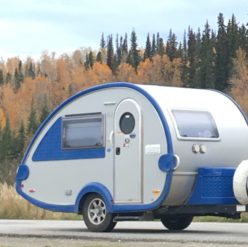Here are just a few suggestions on preparing for any long journey with your trailer/camper/rv. These are by no means exhaustive or conclusive. You might even have a better idea.
- Prepare financially. Get an idea of possible costs and make a budget. There will always be emergencies also, so have extra money available if you need it. Decide how you will handle credit/debit cards and cash. Notify your credit card companies of your approximate itinerary to avoid getting your card declined.
- Prepare an itinerary. It can be as detailed or as flexible as you want depending on your lifestyle. Will you want reservations ahead of time or will you just meander along, finding a place to stay as you go or boondocking? Give family or a friend a copy of your itinerary and emergency numbers.
- Research. Other people have made similar trips. Many have blogs such as mine. Read them. You will get ideas and pointers. BUY A MILEPOST. Every March they publish a new one for the year. It has detailed routes going to Alaska and within Alaska also, mile by mile. Learn how to read the routes backwards or forwards, depending on which direction you are going. From the Milepost, you will be able to tell where gas stations and points of interest are located.
- Read some books about Alaska. Here are some recommendations: “Anchorage, Denali & the Kenai Peninsula: by Don Pitcher 2. “Looking for Alaska” by Peter Jenkins and 3. “The Alaska Highway” by Murray Lundberg.
- Think about trailer security. Hitch locks, wheel locks, re-key the door locks from the original factory ones which are generic, etc. Have duplicates made of each and store them somewhere where you can get to them if needed. If you lose one in the middle of the Yukon or lock yourself out of your trailer, there will be no locksmith to help you!
- Think about your personal security. Handguns are not allowed in Canada. Bear spray is allowed. Wasp spray is a good substitute also. If you plan to hike, bear bells will let the bears know you are around. You don’t want to come up on one and startle them. Personal security is not necessarily equipment, but just be aware and not naive. If you are single, be careful just like you would ordinarily. Don’t be paranoid or scared, but just think ahead.
- Choose and buy comfort items: Visors, tents, outside chairs, patio rugs, outside lanterns etc. will make your travels easier. Don’t get carried away though, or you will have to much weight and stuff! I had both a battery lantern and a propane lantern, which were invaluable in the remote campgrounds which had no lightpoles anywhere. You will want a light of some sort at your picnic table. A couple of flashlights are recommended for walking to and from the bathhouse or just looking around in the middle of the night.
- If you are new to rv/trailering, practice your routines ahead of time, such as hitching up and unhitching, and that pesky backing up! Some places may have pull-thrus available, but those are not guaranteed. People around are usually helpful and will help you if needed, but who wants to feel helpless and unprepared? Go to a parking lot, set up some cones or something similar and practice manuevering.
- Understand power and battery management so that you don’t drain your battery. Have extra fuses available in case something blows. You don’t want to be shivering in the middle of nowhere with no heat! Buy a solar source or generator if necessary.
- Buy groceries – staples and fresh food, snacks and drinks. Have a cooler and ice if necessary.
- Fill your fresh water tank.
- Check tire pressures.
